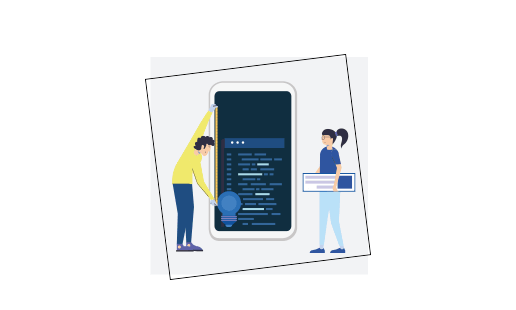

Transform your Products with a
Mobile First Approach
for enhanced customer experience

Mobile apps play a significant role in achieving digital transformation. The rapid proliferation of mobile devices and their adoption not just by consumers, but also by business users, is a significant inflection point for product/services businesses and enterprises. The availability of a mobile version or extension of a product/service is no more a competitive advantage; it is an integral aspect of customer experience.
Mobile solutions offer many digital transformation advantages for your business:
While Progressive Web Apps are an option, mobile apps are still preferred. Building a successful mobile app, which can work across platforms meeting the needs of impatient mobile users is not straightforward. While your business needs to have clear digital transformation goals, plans and focus, you also need to keep in mind the following key mobile app challenges:

Your mobile app needs to stand out among the millions of apps in the app stores. App positioning, functionality, branding, marketing, customer targeting, app analytics and search optimization are all crucial to improve the visibility of your app and make it successful.

Your business should be constantly working towards preventing mobile app abandonment by users. Positive engagement starts with easy customer onboarding, by limiting user inputs for sign-up to the bare essentials. It will improve the app’s retention chances. Post onboarding, your mobile app needs to constantly meet user expectations. An intuitive, consistent, seamless access across multiple devices, clear and simple interface to ease app usage, augmented reality, videos, controlled changes to reduce user resistance as your mobile app evolves, social media campaigns, app notifications and promotions, are some ways to increase user engagement.

Mobile apps must be tailored to the user’s geographic location, personal taste and preferences, and when relevant, their in-app behavior. Instead of a one-size fits all approach, personalization leads to better user experience and satisfaction.

Today, mobile apps are being used for critical applications such as financial transactions, medical data capture, purchases and process control that require security. User data and login credentials stored on the mobile device require strong protection. Intensive testing for security vulnerabilities is required for various combinations of devices and OSs, resulting from device fragmentation. If your mobile app requires service-hosted application services, hosting controls need to be tested for vulnerabilities over a public network.

Enabling m-commerce is important if you are planning to monetize your products/services through the mobile app. Integrating payment functionality, ensuring secure transactions and frictionless payments for users are key commerce features.

Integrating your mobile app with social media is an opportunity to market your products/services without limits. Signing using social media accounts, adding social media sharing, encouraging user engagement with social media feeds, sharing and promoting your mobile app on social media are some ways to utilize social media.

In-depth knowledge of the mobile platform/OS and its peculiarities is important for developing high-performance mobile apps. This together with the use of right programming constructs and best practices can make a difference to app performance. However, performance improvements need to be reviewed in case they dilute app security, which is paramount.

In case your product is a hardware device, creating front panel apps for mobile devices offers mobile users a modern, easier device interface to your product. This involves a good understanding of your product interface and mobile communication protocols.

Though the mobile device market is primarily bifurcated between iOS™ and Android™, there are numerous variants of the brand, hardware, screen sizes, features and OS versions that need to be considered for compatibility. Ensuring that your mobile app works consistently across these varied environments requires considerable development and testing effort.

There are three mobile app development options: native development, hybrid development, and cross-platform development. Each development option has pros and cons with respect to the size of the installer, code portability, look and feel, access to native functionality, engineering skills and cost. You need to carefully consider these factors to make the right decision for both your current and future needs.
Do you have an effective mobile app strategy for your products and services?
Connect with us today to transform your offerings with modern mobile apps.
Digital transformation is driving businesses to adopt a “mobile first” strategy. Businesses are moving away from a strategy of “graceful degradation” (from desktop to mobile) to “progressive advancement” (from mobile to desktop). In this “mobile first” approach, you work within the limits of screen sizes, bandwidth, offline use, etc. and release lean and neat offerings for mobile environments with a prioritized feature set. When the platform is expanded to PC or tablets, you take advantage of additional features of these platforms to strengthen the offering in steps.

When the end goal is creating a successful mobile app, meeting your digital transformation objectives, with the highest quality of user experience possible, it is very important to capitalize on recent trends in technology, tools as well as development processes.

When there is a requirement to develop mobile apps across different platforms, instead of working independently for each platform, the modern integrated development approach is to work together on a common code base and then fork out branches for developing platform-specific UIs. This saves time, money and makes feature enhancement and long-term maintenance more manageable.

Low Code No Code (LCNC) is a development environment that enables non-technical, business users to design, build, and deploy software applications without coding. It provides a graphical user interface and drag-and-drop tools. It is faster and cost-effective and enables rapid prototyping, rapid deployment in new product development.

Cloud offers agility, scale, flexibility, standardization, and reduction of operational costs. Developing hybrid apps which run on the cloud enables faster and cost-effective development as there is a single code base for different mobile OSs. Hybrid apps are more user-friendly as the cloud functionality need not be installed on the mobile device. Apps inherit the cloud benefits such as strong security, dynamic scalability, and easy integration with databases and other systems.

Android Instant apps are an extension of your current Android-based apps that allow apps to run without installation and enable sharing parts of the apps with other apps. It offers benefits similar to Progressive Web Apps.

On-demand apps use device location to recommend nearby providers for any service the app user may need, and they come replete with a review option, GPS tracking option, and push notifications. Clients get instant access to nearby services they require urgently, and businesses get to reach out to their clients without having to woo them with a slew of emails and push notifications.

Wearable technology such as smart watches, glasses and bands is opening new avenues in the mobile industry and could become as popular as smartphones. Popular wearable devices include Apple Watch®, Google Glass™, Microsoft HoloLens®. Wearable apps are different from traditional mobile apps, have constraints such as smaller screen size and require a different design approach. Wearable apps make use of sensors attached, functionalities offered by the wearable device, its constant connection to the human body, constant movement of the humans and much more.

In-app purchases, in-app advertising, sponsored ads, freemium package, loyalty point schemes are some of the monetization methods being used in mobile apps. Besides earning revenue, they offer convenience, provide rewarding experiences to users and engage them in the app experience.

Multiple mobile payment methods have emerged. In addition to traditional card and bank payments, options for mobile and digital wallets, QR codes, Near Field Communication (NFC) are now available. Transactions can be done between mobile numbers, which may not even have linked bank accounts.

The success of mobile apps is no longer determined by the number of downloads, but by user engagement. App monitoring & analytics technology can be used to measure time spent on the app and the features utilized, and obtain direct feedback from users on their experiences and help fine-tune app features. Using mobile application management tools, we can monitor user experience using Real-User Monitoring (RUL) and proactively detect and respond to crashes, hangs and failed/delayed network requests. In addition, app analytics provides information on the nature of mobile devices used, their OS, carriers, etc.

These include the proliferation of mobile apps for IoT, integration of Chatbots and Voice Assistants with apps, use of Artificial Intelligence (AI) and machine learning (ML), connectivity with wearables and beacons, cloud services such as storage, device farm, Accelerated Mobile Pages (AMP) etc.
Are you facing challenges in implementing mobile apps for your products and services?
Connect with us today to leverage our mobile app expertise.
At Celstream, our decade long experience in developing native, hybrid and cross-platform mobile apps can help you implement digital transformation with mobile apps.
Our product engineering services teams have extensive expertise in working with different types of mobile apps and related development technologies. Before selecting an approach, we understand your digital transformation goals and mobile app needs and carefully evaluate multiple options in terms of time to market, effort, cost, performance, choice of technology, maintainability, etc.

Celstream product engineering services teams are experienced in:
TRANSFORM YOUR
PRODUCTS AND SERVICES TODAY!